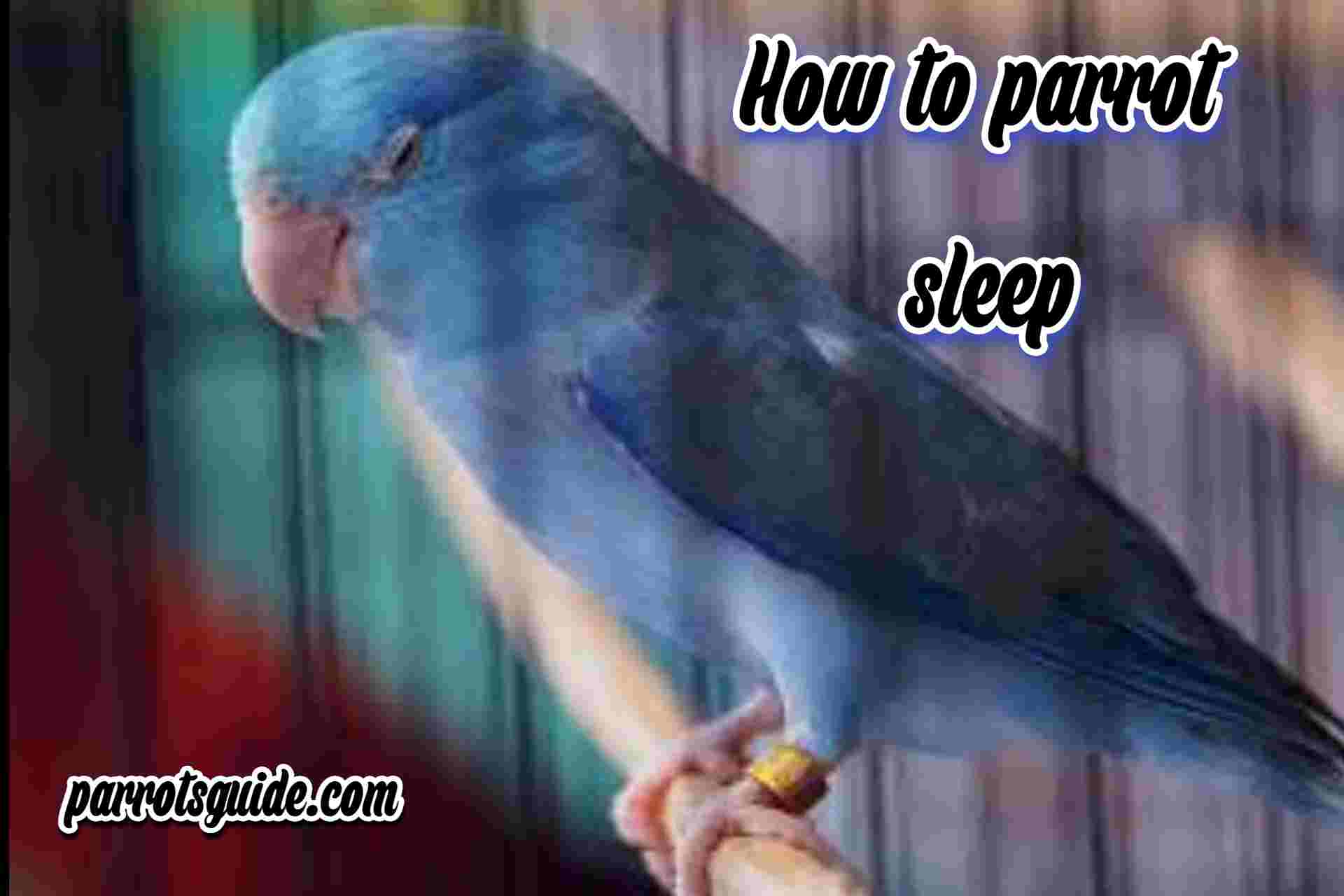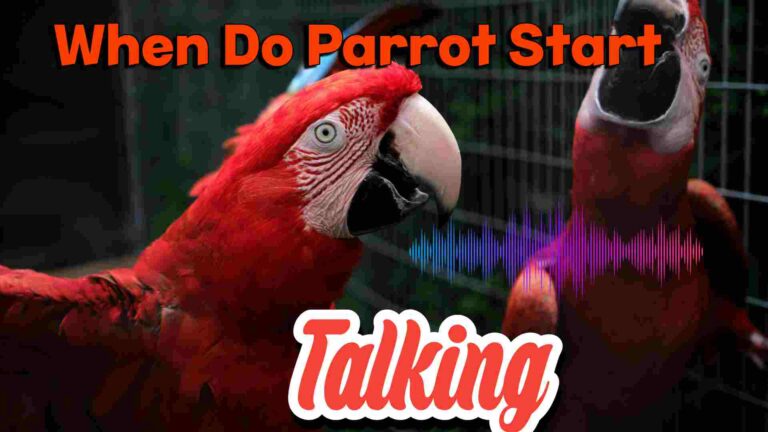How Do Parrots Sleep?[6 Amazing Factors that Affect sleep]
It is interesting to note that like human beings, parrots are endowed with activities such as sleeping which are quite rare in many other animals. It is crucial for any parrot owner to understand this aspect so that he or she can ensure the pet parrot is healthy, comfortable and happy. In the following article, we will analyze the various elements that concern parrot’s sleep such as sleep cycles, positions, and how to provide the best sleep conditions.
Parrot Sleep Patterns
It may be noted that these are diurnal animals which signify the loosing and waking up patterns during the day and at night. As a rule, a parrot should sleep during 10 or 12 hours during the night to maintain the balance of the body. However, the duration of sleep varies according to race, age, and place of dwelling.
For instance, a large parrot such as an African grey or a macaw will undoubtedly require more hours of sleep than a small parrot such as a budgerigar or a cockatiel. As in humans, parrots can sleep slightly during the day particularly after they have wasted a lot of energy, for instance, playing or flying.
How Parrots Sleep: The Physical Aspect
The physical aspect is the one which refers to the use of the person’s body to communicate including the movement of his arms and other parts of the body.
Parrots have critical rest areas that may sound odd to novices in the practice of parrot keeping. I believe that the images that explain a joint position is standing on one leg while sticking the other leg close to your body are true. This position also assists in saving the body heat.
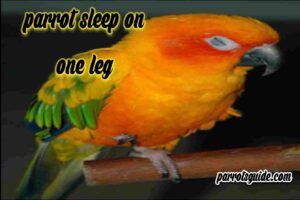
Since parrots gather a lot of fat in their bodies they use wings to cover their heads while sleeping a posture that portrays they are secured. Somewhat curiosity-provoking is that parrots are capable of unihemispheric slow-wave sleep or one half of the birds’ body is alert while the other half is asleep. This enables them to be vigilant in case of any danger while at the same time, they are resting.
Factors Affecting Parrot Sleep Quality
Parrots like all other animals require proper rest at night to achieve stable health and a good state of mind. This paper aims to explore the factors, which may hinder the parrot from acquiring a good number of hours of sleep at night. By being aware of these factors, one can establish an environment that favors a parrot’s natural sleep pattern.
- Light Exposure and Darkness
It is necessary to ensure that parrots get exposed to low light conditions to sleep well. They; especially during the night time, may be exposed to artificial light which would disrupt their biological clock.
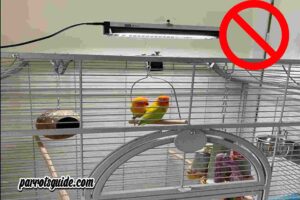
It should be noted that the birds have a circadian rhythm that can react to light and dark periods. If the environment of the parrot is too bright at night it results in a change of its sleep pattern and the bird becomes restless and irritable.
2. Noise Levels and Disturbances
They have ears and are very responsive to noises and any sound or noise that they may come across they get scared of. Children are exposed to loud sounds like televisions, music, or household appliances which puts them under a lot of stress and they cannot sleep well. Such conditions as noise or loud shocking sounds make it difficult for a parrot to have the kind of deep and sound sleep it needs.
3. Temperature and Humidity
It can be stated that getting the environment in which the parrot will be sleeping right in terms of temperature can go a long way in determining the quality of the sleep that the parrot will enjoy.
Regarding the environmental conditions, parrots normally prefer an optimal temperature that makes it neither hot nor cold. You cannot afford to have them get uncomfortable just because of a sharp temperature change which might make them wake up.
4. Sleep Schedule Consistency
The stability of the avian sleep-wake cycle is considered to be one of the most crucial principles of parrots’ sleep hygiene. Parrots grow based on certain schedules and parrots should have equal sleeping and waking hours. Dailiness also assists in maintaining their internal clock which in turn improves sleep.
They argued that changing the routine such as placing the cage of the parrot together with the lights for most of the night is disruptive to their natural cycle and can result in behavior issues among the parrots such as irritability, feather plucking, or an increase in vocalization.
5. Stress and Anxiety
Stress is a major issue that can impact the sleep of a parrot and this has been highlighted as shown below; Parrots are very smart and hence can develop anxiety or stress from various; causes such as changes in their environment, new people in the house,, or even fatigue.
Despite the closeness of the relationship between stress and sleep, parrots might experience difficulties in sleeping or a kind of sleep that is interrupted. It may help to reduce stress-related sleep problems if there are provision of enhancement activities, physical environment, and certainty of their safety.
6. Diet and Nutrition
Another aspect that affects a parrot’s sleep pattern is its diet. They should not be given foods that are energy dense such as seeds and sweet fruits in the evening as it makes them more energetic and restless at night.
On the other side, a diet with proper nutrients may improve the process of relaxation and provide better sleep. The provision of appetizing meals such as green leaves or a small portion of whole grains such as rice within several hours of bedtime will make them ready to sleep.
Creating an Ideal Sleeping Environment for Parrots
Therefore, to ensure that your parrot sleeps well at night and this is essential it is appropriate to establish a good sleeping climate.
The cage of the parrot should be placed in a quiet and boring illuminated room where parrots can feel protected. How the cage can be helpful: Enclosing the cage with a breathable tent can help prevent the toxic light and blocking noises that give a sense of security.
Another way is choosing the right papers as well. Another style of foot saver that can solve foot problems is wooden Slats made from natural wood and in different diameters that give a good grip.
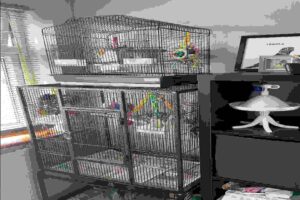
It is also important not to place the cage near areas that are frequently exposed to fresh air or near windows so that any change in temperature does not interrupt their sleep.
Common Sleep-Related Issues in Parrots
Parrots’ sleep disorders can resolve in several manners which include being cranky, feather picking, and aggressive behavior. These signs can indicate that the parrot in question is not getting sufficient quality sleep.
Some of the signs and symptoms that are related to sleep disturbances include noise, the presence of light, and interrupted sleep. Other conditions that may affect their sleep include stress such as moving to a new home or living in a room where there are many activities. Observing these factors, and making the needed preparations, should prove effective options for minimizing incidences of sleep disorders in parrots.
Do Parrots Dream?
It is for such reasons that there is evidence that parrots for instance have esteem for humans who go to sleep with a feature known as the REM, the stage where dreaming is believed to happen. During REM, the parrots move slightly for instance eye rubbing or the flapping of wings will be observed.
Even though it is hard to control the dreaming process as it is done with humans, the fact they undergo REM sleep means that they have some form of dreaming or processing in their minds during sleep.
Conclusion
Hence the information concerning the sleeping habits of the parrots and factors that may influence it is very important to ensure their welfare. So, providing the right environment and ensuring the right balanced sleep schedule will make your parrot enjoy a good night’s sleep and wake up each morning healthy, happy, and re-energized. Look out for those signs demonstrating that your parrot is experiencing problems in accessing quality sleep, and then infuse necessary changes.

